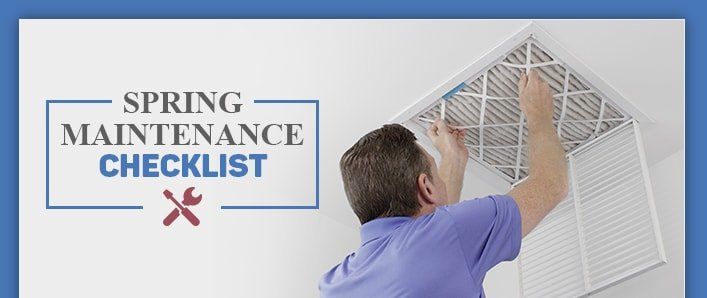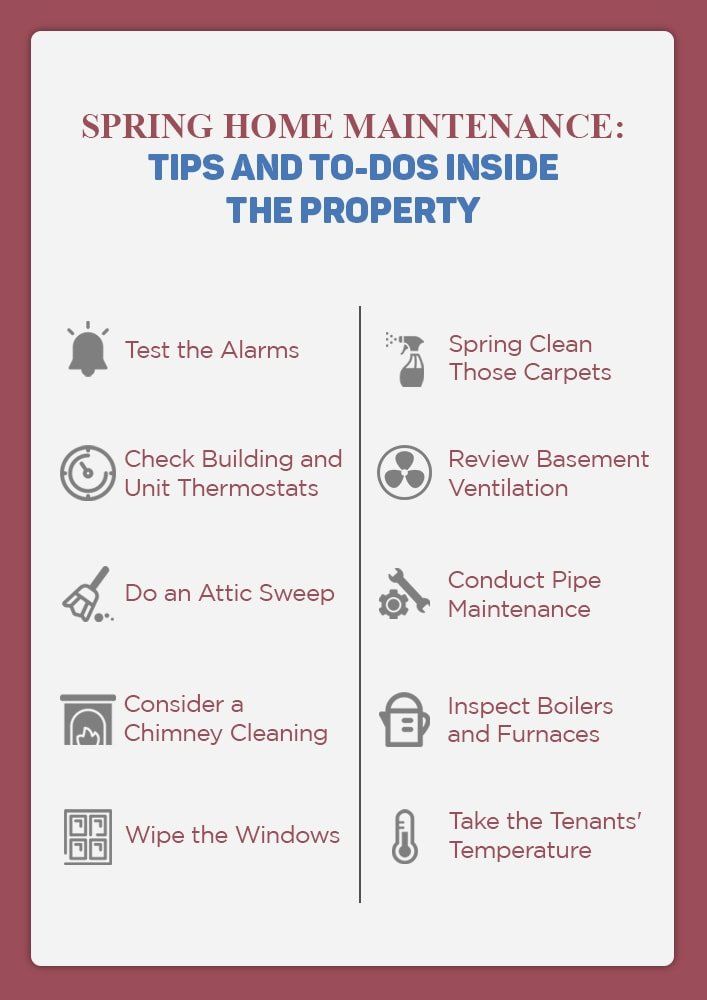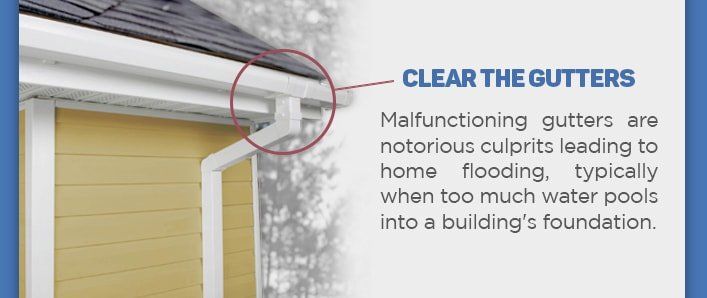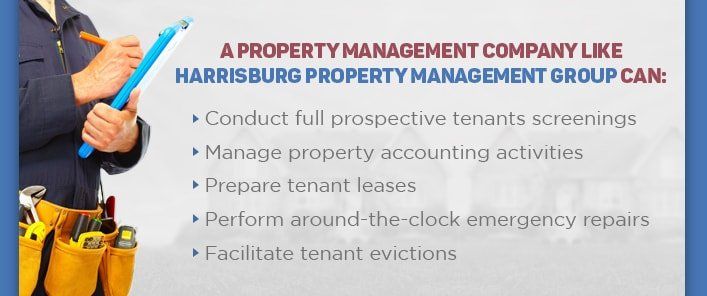Spring Maintenance Checklist | Property Management
Property Maintenance Checklist for Spring
Birds singing, tulips sprouting, lawns greening — springtime is fast approaching here in Pennsylvania. Is your rental property ready?
Warming weather and longer days mean several impending spring home maintenance needs. For Pennsylvania property managers, spring housework takes a little foresight and coordination to implement in apartment units, condos, rental homes and more.
We're simplifying spring cleaning for rental properties with our spring maintenance checklist. Follow these suggestions to spruce up homes after winter's wear and tear — and have them blooming right alongside beautiful flower beds.
Spring Home Maintenance: Tips and To-Dos Inside the Property
A comprehensive spring cleaning checklist works its way inside out. Consider performing each of these activities on your rental properties once warmer weather rolls around.
1. Test the Alarms
Smoke detectors have a lifespan of around ten years. However, they should be checked regularly, one at a time, in each apartment unit or home under your care.
Test both fire and carbon monoxide detectors by pushing the small "test" button available on nearly all models. If the sensor begins to chirp, it's functional. Swap out the batteries at this time as well. Most detector's batteries need replacement once a year, anyway. Adding this set battery swap into your overall spring maintenance checklist is an easy way to ensure it gets done.
Spring is a great time to run a general security alarm test as well, if you have one on your property.
2. Check Building and Unit Thermostats
Building and in-unit thermostats relay vital information about the overall energy efficiency of your property.
It's important to have fully functioning and accurate thermostat readings for many reasons:
- Accurate utility billings: Some utility companies calculate electricity bills based on meter rates. If in-unit thermostats or meters are inaccurate, utility expenses will reflect that. Tenants may grow dissatisfied if their utility charges seem misaligned — or worse, think you're somehow behind the discrepancy.
- Accurate building and room temperatures: Maintaining accurate, steady unit temperatures is essential to happy and satisfied tenants in any season.
3. Do an Attic Sweep
Building attics demand unique maintenance attention. Winter's cold, damp climate outside and the dry, dehumidified air inside can create a perfect storm for cosmetic and structural issues within your property's uppermost level.
During your building's attic check, you'll want to be on the lookout for:
- Wood or beam damage, especially from roof leaks
- Signs of infestations, as many insects and rodents nest into buildings during the winter, looking for places to escape the cold and lay their eggs
- Mold or mildew formations, which in most cases will appear as black stains or splotches on wooden beams or in attic corners
4. Consider a Chimney Cleaning
Chimney maintenance is essential for properties with working fireplaces. Every year, chimney components like its hearth, connecting pipes, chimney chute and air inlets should be cleaned by a certified chimney sweep. Chimney sweepers can also look for damaged or leaking areas before they become major structural concerns.
Adding inserts like chimney balloons can also help with energy efficiency, maintaining warm air inside properties and keeping cold air out — and vice versa come summer.
5. Wipe the Windows
Warmer months mean the possibility of opening windows and letting fresh air into the home. It also means addressing the dirt, grime and debris that may have built up over the wintertime, especially inside window nooks and crannies.
Use a towel, squeegee or sponge to wipe down window panes and window ledges. No abrasive chemical cleaners or high-pressure washers are necessary, just soft cloths. Also consider removing and cleaning window screens with water and a mild detergent, then allowing each to air dry.
6. Spring Clean Those Carpets
Think carpets within a property's common areas like hallways, lobbies, workout facilities and more, which may only receive occasional surface cleanings through all their daily foot traffic. Deep carpet cleaning is especially important if you allow pets in your properties.
A springtime professional carpet-cleaning treatment will remove the dust, allergens and mites that may have settled into carpet fibers, ensuring your property is the pinnacle of a clean and healthy environment.
7. Review Basement Ventilation
A home's ventilation relies on a harmonious system of mechanical fans, filters, ducts and pipes moderating air temperature, air moisture and overall air quality. Basic ventilation system maintenance maintains the lifespan of these vital components across the years.
In places like the basement, proper ventilation is essential for a safe and functional environment. Some property managers choose to flush out their entire vent system come springtime. This affords the system a refresh after the cold winter months, which can be wearing on HVAC systems, as well as primes the mechanics for cooling operations.
Property managers can also run an inspection across all major system components, cleaning or replacing system air filters, checking ducts for mold or mildew, testing ventilation modes, gauging humidity levels, clearing drainage pipes and installing dehumidifiers, if necessary.
8. Conduct Pipe Maintenance
Winter temperatures are not known to be kind to water pipes. Similar to how the vulnerable components in a basement or attic should be checked, pipes are more susceptible to damage during the changing seasons and also need to be inspected.
Keep an eye out for cracks, dents or bulges in pipes. Check pipe seams for any possible leaks or improperly sealed pipelines as well as well-connected pipes and hoses. Be wary of sweaty pipes, as this shows temperature disparities between pipes and the surrounding air that could be indicative of humidity or ventilation problems.
9. Inspect Boilers and Furnaces
The system that kept your properties warm all winter long may need a little rest and recovery come spring. Like alarms, boilers and furnaces should be inspected annually and even serviced by professionals, who can perform such maintenance tasks as cleaning the combustion chamber, checking the flue pipe and testing and adjusting the burner.
Other boiler and furnace basic maintenance include:
- Lubricating the blower motor on the heat pump
- Lubricating the motor and circulating pump within the water heater
- Changing the air filters on the furnace
10. Take the Tenants' Temperature
It's always a good idea to hear feedback from actual residents on the state of the building. Tenants can provide first-hand feedback on how day-to-day building and unit conditions were throughout winter. Asking tenants directly about their experience reminds them that you consider their opinions a priority. The extra attention shows you're diligent as a property manager, willing to go the extra mile to make the most comfortable home possible for residents.
Home Maintenance for Spring: Tips and To-Dos Outside the Property
Just as you have a spring cleaning checklist inside your buildings, the outside also needs some post-winter care. Use the following to stay on top of exterior home maintenance and have your apartment, condos or rental homes in peak condition.
1. Review the Roof
Well-maintained, high-quality roofs help regulate interior building temperatures, maintain energy efficiency and keep a house or apartment cozy and dry. They also look great, enhancing the overall appearance of your property.
Roof inspections should start with surveying the shingles. Each should be intact and properly positioned, showing no signs of chips or dents. You'll want to be on the lookout for nail pops, a common roofing issue where an individual nail begins to push a shingle's tabs up. If unaddressed, nail pops can allow water to flow beneath shingles, which can lead to potential leaks and structural damage.
Also use your roof inspection to check for membrane splits, odd water pools or damage to roof counter flashes as well as areas near home fixtures such as chimneys and skylights.
2. Replace Damaged Screens
Torn or damaged window screens may have gone undetected during the winter months. After all, few people are opening their windows during a Pennsylvania snowfall.
If possible, remove each screen from its pane for an up-close inspection. Loose wires or minor fraying around the edges are common in screens nearing the end of their 10- to 15-year lifespan and indicate it's almost time to replace them. Other more obvious problems, such as patches or actual holes, mean the screen needs to be replaced immediately to avoid issues like bug infiltration.
3. Clean and Clear Vents
With the snow melting and the ground clearing up, your spring maintenance checklist should also address exterior vents connected to your property's interior HVAC components. This includes dryer vents, bathroom vents and range vents. Every exterior outlet should be cleared to allow proper air flow and prevent accidental fires.
Clearing exterior vent outlets is as easy as removing plants and plant debris surrounding their bases. An outlet's radius should remain clear and unobstructed throughout the seasons.
4. Repaint Siding Chips
Chipped, cracked or peeling paint doesn't just cheapen the look of a property. If severe enough, they can lead to home insulation issues, which creates higher heating and cooling costs due to mounting energy inefficiencies within the home.
Spring is a great time to give chipped building siding a facelift. Pick a paint day with moderate temperatures and no rain in the forecast, then work your way along problem patches from the front of the building to the back.
5. Clear the Gutters
Malfunctioning gutters are notorious culprits leading to home flooding, typically when too much water pools into a building's foundation. Left unaddressed, these are expensive and laborious building repairs — ones that could have been avoided by an annual spring gutter cleaning.
Look for gutter stains, which are most common near eaves or at gutter spouts. These typically indicate your gutters have irregular flows that are not channeling proper roof runoff. Ensure rainwater is flowing away from your building's foundation as well, not toward it.
6. Show the AC Some Love
Perform spring maintenance on your air conditioning before summer sets in and the unit will be in high demand. Begin by cleaning out the air conditioning coils and drain pans, using a regular garden hose set on a low stream. Replace air conditioner filters, if you haven't yet done so. Check the unit's belt tensions for proper security as well as cracks or wear. As you did with exterior vent outlets, remove excess plants or debris surrounding your outdoor air conditioning unit.
7. Fix Lawn Patches
Thorough property management goes beyond managing tenants and keeping the building looking nice. It also involves apartment or home landscaping, which adds instant curb appeal and makes your properties jump out to prospective residents.
The warmer months of April and early May are ideal times to replant grass in patchy areas. Patches that are still yellow or brown at this point can be removed and resodded with grass seedlings that, come summer, will reinstate a lush, green look to the whole lawn.
8. Aerate and Fertilize
Lawn aeration and fertilizer prep the soil for spring plantings and eventual lawn mowings. They get vital nutrients back into the ground, jumpstarting lawn growth and health after the long winter months.
Aeration and fertilizer sessions are also a great time to test your sprinkler systems, checking for leaks, rust and proper spray patterns.
9. Check Sidewalk, Exterior Stairs and Ramp Conditions
Even hairline sidewalk cracks on your property can diminish its overall appearance. Over time, cement and asphalt cracks loosen, breaking down essential exterior building infrastructures like wheelchair ramps or doors leading to stairs. Melt-in filler products can be found at your nearest hardware store. These materials work like caulk but for outdoor applications, filling into sidewalk, stairway or driveway cracks before they become potential safety hazards as well as cosmetically unappealing.
10. Conduct Deck or Porch Repairs
If your property contains decks or porches, check their boards, railings and stairwells for cracks, disjoints or loose members. You can also survey the condition of wood treatments like staining or UV-protective coats, which typically need re-application every five to six years. If wood looks water damaged, source replacement boards or hire a deck professional to make necessary alterations.
Working With a Property Management Partner for Spring Maintenance Needs
Property managers have plenty on their plates — with or without a spring maintenance to-do list. It can be challenging to make time even for basic building or landscaping inspections between marketing properties, screening potential candidate applications, preparing leases, tackling unit repairs and handling all the accounting, tax filing and administrative duties required of property owners.
It's one reason many people turn to a property management partner. In addition to taking care of year-round building and landscaping maintenance demands, a property management company like Harrisburg Property Management Group can:
- Conduct full prospective tenants screenings, including rental history, eviction history, background and credit checks
- Manage property accounting activities, from security deposits and rent collection to tax filing and utility payments
- Prepare tenant leases using accredited, in-area legal counsel
- Perform around-the-clock emergency repairs
- Facilitate tenant evictions and the compliant legal procedures that follow
Proper Management and Spring Maintenance Help in Harrisburg
Harrisburg Property Management Group was founded by a group of commercial and residential property owners who knew there was a better way to manage their buildings and service their tenants.
You don't have to do it all alone — and you shouldn't. With a full-service property management partner, building and grounds maintenance is another item off your to-do list and one more reassurance you're running the best properties possible.


















